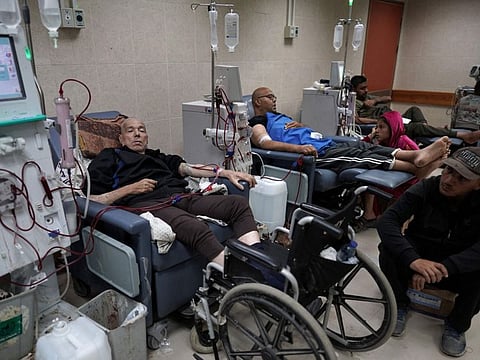‘No force in the world will stop us’: Gaza war rages as Hamas studies truce proposal
Netanyahu: Israeli forces will storm Rafah despite global concern for fate of 1.5 million

GAZA STRIP: Israel bombed targets in Gaza on Tuesday after Prime Minister Benjamin Netanyahu insisted the army would destroy Hamas despite ongoing Cairo talks towards a ceasefire and hostage deal.
More than six months into the war, Hamas said it was “studying” a new proposal for a temporary truce, submitted during the talks with US, Qatari and Egyptian mediators.
Under the plan, fighting would stop for six weeks, about 40 women and child hostages would be exchanged for hundreds of Palestinian prisoners, and up to 500 aid trucks would enter Gaza per day, a Hamas source said.
Hamas said it “appreciates” the mediators’ latest efforts but accused Israel of failing to respond to its demands including a full withdrawal of forces from Gaza.
Netanyahu stressed - despite growing pressure from top ally the United States - that Israel would pursue the twin goals of bringing home “all our hostages” and destroying Hamas after its October 7 attack.
In a video message Monday, the premier said Israeli forces would storm Gaza’s far-southern city of Rafah on the Egyptian border, despite global concern for the fate of around 1.5 million Palestinians sheltering there.
“This victory requires entry into Rafah and the elimination of the terrorist battalions there,” Netanyahu said.
“It will happen - there is a date,” he vowed without saying when he plans to send troops into the last city in Gaza yet to face a ground invasion.
Secretary of State Antony Blinken said Israel had not shared with Washington “any date for an operation” in Rafah.
Netanyahu reiterated that message on Tuesday during a visit to a military base, saying: “No force in the world will stop us.”
US officials renewed their objections to a Rafah operation, following a phone call last week between President Joe Biden and Netanyahu.
“We have made clear to Israel that we think a full-scale military invasion of Rafah would have an enormously harmful effect on those civilians and that it would ultimately hurt Israel’s security,” said State Department spokesman Matthew Miller.
Israel has invited tenders for 40,000 large tents, according to a document on the defence ministry website - part of its preparations to evacuate Rafah ahead of an offensive, a government source told AFP on condition of anonymity.
‘Gaza is not Gaza anymore’
The carnage left by the bloodiest ever Gaza war was on display in the southern city of Khan Yunis, a wasteland of shattered buildings and mountains of rubble after months of heavy bombardment and street fighting.
Displaced Palestinians began to return after Israeli forces pulled out on Sunday in what the army said was a tactical and temporary withdrawal.
As Palestinians readied for Wednesday’s Eid Al Fitr holiday marking the end of the fasting month of Ramadan, they were stunned at the apocalyptic sight of hundreds of gutted or collapsed buildings.
“I came to see my home, only to find it destroyed and reduced to a pile of rubble,” said Umm Ahmad al-Fagawi.
Another woman said she had come back to find “a ruined place - no water, no electricity, no columns, no walls and no doors, there’s nothing. Gaza is not Gaza anymore.”
The war broke out with Hamas’s October 7 attack against Israel, which resulted in the deaths of 1,170 people, mostly civilians, according to Israeli figures.
Palestinian militants also took more than 250 hostages, 129 of whom remain in Gaza, including 34 the Israeli army says are dead.
Israel’s retaliatory offensive has killed at least 33,360 people in Gaza, mostly women and children, according to the Hamas-run territory’s health ministry.
The army said Tuesday it had destroyed “terrorist infrastructure” across Gaza and an “aircraft eliminated a terrorist in Khan Yunis who participated in the October 7 massacre”.
In the central Gaza Strip, “troops eliminated a number of terrorists in close-quarter combat,” it said. “Several additional terrorists who posed a threat to the troops were eliminated by aircraft strikes and precise sniper fire.”
A UN team on Monday inspected Al-Shifa hospital, Gaza’s largest, which was devastated in two weeks of fierce fighting.
While the war has destroyed swathes of the Gaza Strip, levelling entire city blocks, an Israeli siege has pushed many of its 2.4 million people to the brink of famine.
Global pressure
Israel, under pressure to step up aid deliveries, on Monday allowed in 419 aid trucks, said the Israeli defence ministry body COGAT, describing it as a daily record since the start of the war.
That is still below the levels the UN says entered the Gaza Strip before the war devastated the territory and its economy.
Israeli officials have blamed aid agencies for not distributing the aid, but those agencies have hit back blaming Israeli restrictions.
Speaking in Geneva, Jens Laerke, a spokesman for the United Nations’ humanitarian agency, called the figures provided by Israel on aid distribution “meaningless”.
Screening rules, delays at crossings, restrictions on drivers and, most significantly, getting authorisation and assurances from the military that distribution can go ahead unimpeded combined to prevent aid distribution, he said.
Laerke also said food aid was three times more likely to be blocked by Israel than any other kind of aid.
Israel has faced a chorus of global calls to halt the fighting and ease the suffering, including from France, Egypt and Jordan.
French Foreign Minister Stephane Sejourne, demanding that vastly more aid be allowed into Gaza, said there are multiple “levers of influence” available including sanctions.
Turkey said it would impose trade restrictions on Israel, covering cement and steel, sparking an Israeli vow to take retaliatory steps.



